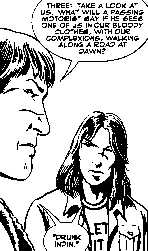Home |
Contents |
Photos |
News |
Reviews |
Store |
Forum |
ICI |
Educators |
Fans |
Contests |
Help |
FAQ |
Info


Going Native
By Gregorio Rodriguez
San Antonio Current, 12/30/99-1/5/00
 "For a subject worked and reworked so often in novels, motion pictures, and television, American Indians are...the least understood and the most misunderstood Americans of us all," said President John F. Kennedy in 1963. JFK probably didn't think his words would end up on the back cover of a comic book titled Peace Party, but Rob Schmidt, writer and publisher of the new work from Blue Corn Comics, believes he can take up the challenge of popular representation through this graphic format.
"For a subject worked and reworked so often in novels, motion pictures, and television, American Indians are...the least understood and the most misunderstood Americans of us all," said President John F. Kennedy in 1963. JFK probably didn't think his words would end up on the back cover of a comic book titled Peace Party, but Rob Schmidt, writer and publisher of the new work from Blue Corn Comics, believes he can take up the challenge of popular representation through this graphic format.
Native Americans have always been plagued by stereotypes and prejudices, and Schmidt looks no further than the Cleveland Indians' "Chief Wahoo." But kids absorb this kind of ignorance too, in daily doses; a recent episode of Animaniacs, titled "Jokahontas," parodied Disney's Pocahontas while reinforcing Indian stereotypes. The question is: Without having lived the life of a Native American, Latino, or African American, how can a writer create such characters without falling into the stereotypes that most people would assume factual?
Schmidt, who has studied Native American life extensively, formed a Board of Advisors to prevent such errors and to help him portray Native Americans honestly. Yes, comics by committee: Schmidt's Board of Advisors includes Steve Russell, a member of the Cherokee nation and assistant professor of social and political science at the University of Texas at San Antonio, and Sonny Skyhawk, a Sicangu Lakota and president of American Indians in Film, among others. In another unprecedented move by a comic book company, Blue Corn plans to donate a percentage of its profits to nonprofit organizations benefiting Native Americans.
Like its parent company, Peace Party works on many levels. First and foremost, a comic book should set out to entertain, and this one does that. Caught in the struggle to find a middle ground between tradition and modern life, we find our two heroes: Drew (Snake Standing) Quyatt and Billy (Rain Falling) Honanie. On the way back from a camping trip, Drew and Billy are involved in a car accident, knocked unconscious, and visited by a deity who bestows them with their unique powers, so that they may work to bring the world back from the brink of upheaval. "More and more you have abandoned your traditions, giving yourself over to worldly concerns. You have strayed from the proper path of life." Once they have received their powers, Drew, raised on the reservation, accepts them as a blessing, while Billy, the lawyer, sees this gift as a hindrance. Clearly this is meant to reflect what is going on in many cultures today, where the youth are ambivalent about the traditions and rituals of their ancestors. Our heroes quickly beat a path back to the world we all know and love; no one will pick them up or help them with the accident. Billy explains to Drew, "Take a look at us. What will a passing motorist say if he sees us in our bloody clothes, with our complexions, walking down the road?"
Peace Party not only boasts a strong Native-American cast, but also offers characters that are a fair representation of America, with an African-American sheriff and Hispanic journalist rounding out the characters that have appeared in just two issues. The first two issues deftly indicate the type of sociopolitical, ecological, and cultural topics that Peace Party will face. With a coal-mining factory destroying the land, Billy coming to terms with his powers, and a diverse cast populating the background, Peace Party won't be running out of story ideas anytime soon.
Luckily for the reader, the socially conscious spin doesn't hit you on the head like a ton of bricks. This is, after all, a comic book that intends to be a fun read. Intelligent, poignant, and a much needed comic for the times, the stories in Peace Party made me ponder how far people have strayed from their path, and how one should worry about sustaining traditions. The excesses of modern life dictate worry in all directions, but the message of Peace Party would seem to call for a more simple, a more natural and native state of being. It makes sense, especially for a culture that so badly needs to come to terms with simply knowing and seeing itself represented in more accurate colors.
* More opinions *
|
|
. . .
|

|
Home |
Contents |
Photos |
News |
Reviews |
Store |
Forum |
ICI |
Educators |
Fans |
Contests |
Help |
FAQ |
Info
All material © copyright its original owners, except where noted.
Original text and pictures © copyright 2007 by Robert Schmidt.
Copyrighted material is posted under the Fair Use provision of the Copyright Act,
which allows copying for nonprofit educational uses including criticism and commentary.
Comments sent to the publisher become the property of Blue Corn Comics
and may be used in other postings without permission.
 "For a subject worked and reworked so often in novels, motion pictures, and television, American Indians are...the least understood and the most misunderstood Americans of us all," said President John F. Kennedy in 1963. JFK probably didn't think his words would end up on the back cover of a comic book titled Peace Party, but Rob Schmidt, writer and publisher of the new work from Blue Corn Comics, believes he can take up the challenge of popular representation through this graphic format.
"For a subject worked and reworked so often in novels, motion pictures, and television, American Indians are...the least understood and the most misunderstood Americans of us all," said President John F. Kennedy in 1963. JFK probably didn't think his words would end up on the back cover of a comic book titled Peace Party, but Rob Schmidt, writer and publisher of the new work from Blue Corn Comics, believes he can take up the challenge of popular representation through this graphic format.